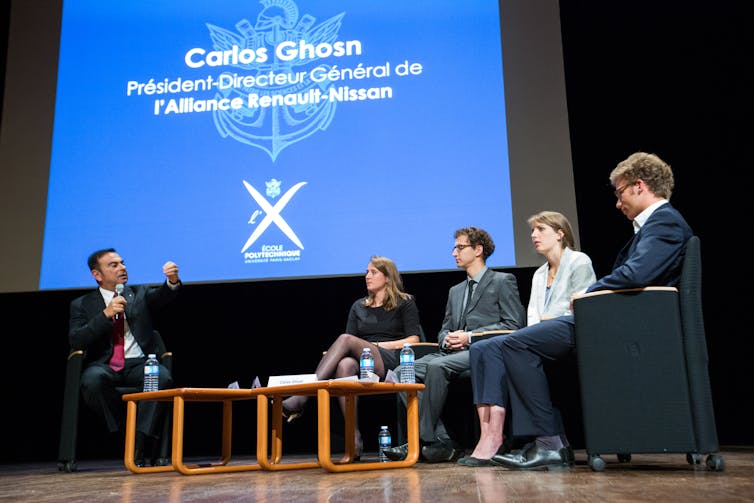X, ENA... The power of the network, an obstacle to controlling leaders with harmful effects
Everyone knows how important networks are in the business world. The power of the alumni networks of École Polytechnique and École Nationale d'Administration (ENA) is well established. Rigorously selected and trained at taxpayer expense to serve the public interest, these graduates have largely taken over the management of large private companies.
Pascal Nguyen, University of Montpellier and Cédric Van Appelghem, University of Evry – University of Paris-Saclay

The state's involvement in key sectors of the economy is no stranger to this. It creates bridges that allow those who wish to do so to capitalize on their experience in senior government positions, particularly in ministerial offices, while also building up a very useful network of contacts.
The result is an overrepresentation of graduates from École Polytechnique or École Nationale d'Administration (ENA) at the helm of major French companies. This situation is virtually unparalleled anywhere else in the world. By way of comparison, only 11 of the 100 largest publicly traded companies in the United States are headed by graduates of the Ivy League, a group of eight prestigious universities that includes Harvard, Yale, and Princeton among its members.
As a reminder, 13 of the CAC 40 CEOs (i.e., one-third) are graduates of just two schools, École Polytechnique and ENA. Since most board members are also executives, boards of directors often include members who share the same educational background as the CEO and are therefore part of his or her network.
At first glance, one might think that this concentration of talent is an asset for the company. But on closer inspection, is a team made up of the best players really the best team? In sports, we know that this is not always true.
Real Madrid proved this in 2004 with a team of world-class stars assembled at great expense, yet which failed to win a single trophy at the end of the season. Beyond individual talent, it is important not to overlook the importance of teamwork. The quality of the group cannot be summed up by simply adding up the qualities of each of its members.
Adverse effects
The arithmetic of teams holds another surprise. Researchers at Harvard analyzed the performance of venture capital co-investments. As might be expected, managers who graduated from top universities are associated with better performance. This is rather reassuring for the universities in question.
But more curiously, when both co-managers come from the same university, however prestigious it may be, performance is much poorer. The authors do not elaborate on the reasons for this underperformance, but it is likely that the lack of critical perspective towards those who are similar to us plays a key role.
This raises the question of whether having board members with the same background as the CEO leads to equally damaging results. The risk for the company is that the board of directors will not push the CEO hard enough to question, or even challenge, the validity of his strategy. The danger is that the company will then go down the wrong path and end up at a dead end.
The setbacks experienced by certain French companies can be attributed to mistakes that could have been avoided if the directors had been more critical of the decisions made by the CEO. Among the biggest losses suffered by French companies, several come from companies whose boards of directors were made up of members who belonged to the same alumni network as the CEO.

Shutterstock
First and foremost, Vivendi stands out with a loss of €23.3 billion in 2002. At the time, the company was headed by Jean-Marie Messier, whose brilliant academic career included degrees from École Polytechnique and ENA. The only problem was that Vivendi's board of directors also included three graduates of the École Polytechnique and four former students of the ENA, who, like Messier himself, were finance inspectors. It is therefore likely that the board's leniency towards the most brilliant among them prevented them from detecting the problems early enough and correcting the situation before it was too late.
Detrimental consequences
When directors have close ties to the CEO, the board's ability to hold the CEO accountable is necessarily compromised. This reality is acknowledged in the Afep-Medef governance code, in the case of financial or family ties, to define the independence of directors. On the other hand, social ties, such as those resulting from attending the same school, are completely ignored. Yet these ties affect the ability of directors to control the CEO just as much.
In the absence of appropriate oversight, managers may simply manage the company's affairs quietly without having to make too much effort or take too many risks. This conclusion, which may seem exaggerated, has in fact been convincingly demonstrated in the case of American companies. As a result, we can expect the company to perform less well. Francis Kramarz (Director of Research at ENSAE-ENSAI) and David Thesmar (Professor of Economics at MIT) prove this in the French context.
In the longer term, this results in a loss of competitiveness for the company. One indicator of this fragility is the company's greater sensitivity to economic fluctuations. Our article to be published this month in the Revue d'Économie Politique shows more specifically that companies whose boards of directors include members with backgrounds similar to those of their CEOs have stock market returns that are more strongly correlated with the market. When the economy slows down, the market declines and the value of these companies falls even further.
Studies also show that when executives are entrenched, in other words when they do not have to fear losing their jobs, companies tend to invest less in research and development, the outcome of which is known to be highly uncertain. They are therefore less innovative. Our findings point in the same direction, suggesting that the presence of networks within the board of directors contributes to the leader's security.

Shutterstock
Two other consequences arise from this situation. The first is that the company tends to be less transparent. It discloses less relevant information. Didn't Jean-Marie Messier declare that "Vivendi is doing better than well" before announcing huge losses? Investors therefore have reason to be wary and demand a higher risk premium.
In an article published this year in the journal Comptabilité Contrôle Audit, we were able to show that social ties between the CEO and the board members result in higher equity costs. The company's growth rate is also lower.
Aggravating factors and possible remedies
All these problems are amplified by the concentration of power in the hands of the CEO, as is the case when he or she has been in office for a number of years and holds the positions of CEO and chairman of the board of directors. A typical example is that of Carlos Ghosn, whose decisions were never questioned by Renault's directors until his spectacular arrest by the Japanese police.

Wikimedia, CC BY-SA
However, several external governance mechanisms can compensate for the weakness of the control exercised by the board of directors. Block shareholders have the means to make their voices heard and should be all the more vocal given that they have financial interests to defend. They can also threaten to sell their shares, which would constitute a scathing rebuke of the executive and could permanently tarnish his or her reputation.
Monitoring by financial analysts also helps prevent directors who are close to the CEO from providing overly complacent support. By highlighting the company's strategy and emphasizing its financial implications, analysts mitigate the risk of board dysfunction. The pernicious effects of the social ties mentioned above are thus better controlled.
Other factors could also play a beneficial role. It can be assumed that the continued internationalization of French companies will promote greater diversity in profiles, which should reduce the influence of networks. Large national companies such as Axa and Air France-KLM are now headed by men (Thomas Buberl and Ben Smith) who completed all their studies and spent most of their careers abroad.
The greater proportion of women since the Copé-Zimmermann law was passed is another factor that could lead to better functioning boards of directors. We know, for example, that the presence of female directors significantly reduces the risk of fraud and accounting manipulation.
Finally, increased competition with the opening up of markets such as rail transport and gas and electricity supply could also impose greater discipline and thus reduce the appeal of companies to former senior officials and their associated networks.![]()
Pascal Nguyen, Professor of Finance, University of Montpellier and Cédric Van Appelghem, Senior Lecturer in Management Sciences – Researcher at LITEM, University of Evry – University of Paris-Saclay
This article is republished from The Conversation under a Creative Commons license. Readthe original article.